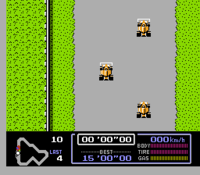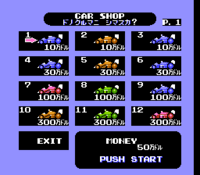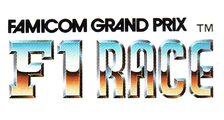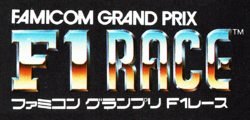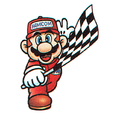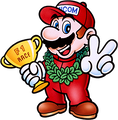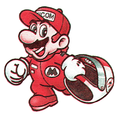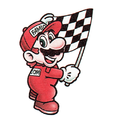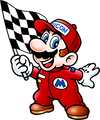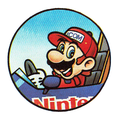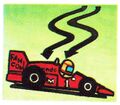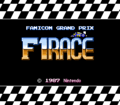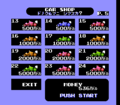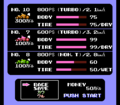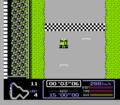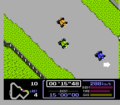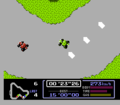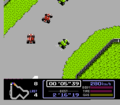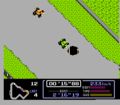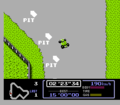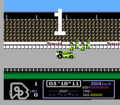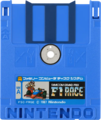Famicom Grand Prix: F1 Race: Difference between revisions
m (→Cars) Tag: Mobile edit |
mNo edit summary Tag: Mobile edit |
||
| Line 16: | Line 16: | ||
'''''Famicom Grand Prix: F1 Race''''' is a racing game released for the [[Family Computer Disk System]] on October 30, 1987. It is a racing game starring [[Mario]] in {{wp|Formula One}} cars, as a successor to the 1984 racing game ''{{wp|F1 Race}}''. A tournament was held for this game from October 30 to December 15, 1987. The top 100 players of each of the four difficulty levels received a trophy with their name and rank along with a poster that had the names of all 400 trophy holders. They, along with thousands of runners-up and raffle winners, received a [[Super Mario Bros. (Game & Watch)|''Super Mario Bros.'' Game & Watch]] sealed in a case shaped like Diskun, the mascot of the Disk System who appeared on all Disk System game covers. They also received mock driver's licenses.<ref>{{cite|url=www.youtube.com/watch?v=LkgCL38Xzj4|title=【激レア賞品】 入賞トロフィー&ゲームウォッチ! ファミコンのF1レースの入賞賞品を紹介しちゃうよ!|author=駄菓子屋ゲーム博物館チャンネル|date=May 3, 2020|publisher=YouTube|language=ja|accessdate=July 26, 2024}}</ref> A sequel was released months later, known as ''[[Famicom Grand Prix II: 3D Hot Rally]]''; it was very different from this game and also the subject of a tournament. | '''''Famicom Grand Prix: F1 Race''''' is a racing game released for the [[Family Computer Disk System]] on October 30, 1987. It is a racing game starring [[Mario]] in {{wp|Formula One}} cars, as a successor to the 1984 racing game ''{{wp|F1 Race}}''. A tournament was held for this game from October 30 to December 15, 1987. The top 100 players of each of the four difficulty levels received a trophy with their name and rank along with a poster that had the names of all 400 trophy holders. They, along with thousands of runners-up and raffle winners, received a [[Super Mario Bros. (Game & Watch)|''Super Mario Bros.'' Game & Watch]] sealed in a case shaped like Diskun, the mascot of the Disk System who appeared on all Disk System game covers. They also received mock driver's licenses.<ref>{{cite|url=www.youtube.com/watch?v=LkgCL38Xzj4|title=【激レア賞品】 入賞トロフィー&ゲームウォッチ! ファミコンのF1レースの入賞賞品を紹介しちゃうよ!|author=駄菓子屋ゲーム博物館チャンネル|date=May 3, 2020|publisher=YouTube|language=ja|accessdate=July 26, 2024}}</ref> A sequel was released months later, known as ''[[Famicom Grand Prix II: 3D Hot Rally]]''; it was very different from this game and also the subject of a tournament. | ||
This game, along with its sequel, was possibly an ancestor to the ''[[Mario Kart (series)|Mario Kart]]'' series, most likely due to the fact that it features Mario and possesses similar 2D racing mechanics, which | This game, along with its sequel, was possibly an ancestor to the ''[[Mario Kart (series)|Mario Kart]]'' series, most likely due to the fact that it features Mario and possesses similar 2D racing mechanics, which was later carried on to ''[[Super Mario Kart]]''. In this game, Mario is the player's driver, wearing the same color as the vehicle he drives; his likeness is also used for his pit crew, with all but the crew chief also wearing the car's color. | ||
==Gameplay== | ==Gameplay== | ||
Revision as of 15:04, October 4, 2024
| Famicom Grand Prix: F1 Race | |
|---|---|
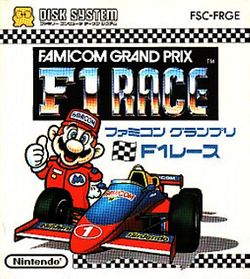
| |
| Developer | Nintendo EAD HAL Laboratory |
| Publisher | Nintendo |
| Platform(s) | Family Computer Disk System |
| Release date | |
| Language(s) | English (United States) |
| Genre | Racing |
| Format | FDS:
|
| Input | NES:
|
| Serial code(s) | FSC-FRGE |
Famicom Grand Prix: F1 Race is a racing game released for the Family Computer Disk System on October 30, 1987. It is a racing game starring Mario in Formula One cars, as a successor to the 1984 racing game F1 Race. A tournament was held for this game from October 30 to December 15, 1987. The top 100 players of each of the four difficulty levels received a trophy with their name and rank along with a poster that had the names of all 400 trophy holders. They, along with thousands of runners-up and raffle winners, received a Super Mario Bros. Game & Watch sealed in a case shaped like Diskun, the mascot of the Disk System who appeared on all Disk System game covers. They also received mock driver's licenses.[2] A sequel was released months later, known as Famicom Grand Prix II: 3D Hot Rally; it was very different from this game and also the subject of a tournament.
This game, along with its sequel, was possibly an ancestor to the Mario Kart series, most likely due to the fact that it features Mario and possesses similar 2D racing mechanics, which was later carried on to Super Mario Kart. In this game, Mario is the player's driver, wearing the same color as the vehicle he drives; his likeness is also used for his pit crew, with all but the crew chief also wearing the car's color.
Gameplay
In the game, players can choose to play alone or with other cars. Cars have a certain amount of body quality, tire quality, and fuel. Body decreases whenever the player crashes into a wall or another car, as well as whenever they drive off the road; tire decreases with time and decreases faster while the player is off-road; and fuel decreases with time spent accelerating. Running out of body or fuel is an immediate disqualification, but both have no effect before being fully depleted beyond warning chimes. As tire depletes, however, the car's treads wear out and make turning have gradually less friction, with the traction becoming completely slippery and erratic when the meter is fully empty. Cars with a higher rating in any of those categories take longer to deplete, and higher ratings of tire start out with much better traction as well than lower ones. The player can go to a pitstop to regenerate the body, tire, and fuel; the pitstop can take a moment to complete, but rapidly pressing and
repeatedly during it speeds the process up, which can be crucial in not losing one's placement by a large margin.
Steering is done with the Left and Right buttons on . Due to the camera angle, this means careful attention must be paid to the direction the car is going when preparing to steer. When the player starts a race,
revs the car in low gear, while
brings it up to high gear, as a predecessor to the Rocket Start; from here,
is used for acceleration. The same process can also be done during the race if the player has slowed down; skipping straight to high gear causes it to sputter slowly. Additionally, certain cars are capable of turbo, which allows them to continue accelerating beyond their typical top speed when
and Up on
are pressed at the same time. Pressing
and
at the same time, meanwhile, allows the driver to brake. As with most games, pausing is done by pressing
; when on the pause screen, the player can retire by pressing
.
Winning the Grand Prix rewards players with money (measured in millions of dollars), which can be used to buy more expensive cars. There is a total of 24 different cars, each having a different level of power, body, tire, and fuel capacity, though they also cost varying amounts. The player's garage can hold up to three cars at a time, so to buy a fourth, one must first be sold. The player cars come in red, yellow, green, and blue, while opponent cars additionally come in different colors (which, due to palette limitations, are rendered through combinations of the four main colors rapidly flashing between each other to blend them together, with the fastest one flashing between all four).
There is a total of ten circuits spread across four race levels (analogous to cups) with four circuits each—as such, some circuits appear in multiple race levels. The primary difference between the race levels is how fast the opponents can drive and how low the player can rank before being disqualified, both of which become more challenging on higher levels. The majority of the circuits are classified as Dry, meaning traction is good on them, but a small number are instead Wet, where traction is poor. Usually, other cars, walls, and off-road areas are the only obstacles, but occasionally oil slicks appear on the road as well from retired competitors.
In every level, the player starts in the back of the starting grid. In each further race, their position is instead determined by their standing in the level, so if they are in first place, they start at the front. To continue to the next race in any given level, the player must finish within ninth place in the first two levels or within sixth place in the second two levels. Finishing within the top six always earns a cash reward; knocking apart lesser cars, meanwhile, results in a fine. If the player does not finish within the required placement, that vehicle is retired. If all the player's vehicles are retired, it results in a Game Over.
In Time Trial mode, the player can record and beat times on six unique circuits, as well as use them to practice the game's mechanics. A car is provided for these, and the player can choose whether or not it is turbo-capable, as well as the course and number of laps. The specific car can be chosen by pressing Down on ,
, and
all at once on a controller in port 2 to bring up a list and then using
and
to choose, though the car's turbo settings must match the menu's. Multiple players can play on this mode via taking turns.
If the player crashes into a wall, rather than coming to a full stop, they bounce off it at an angle depending on their current position; as such, crashing into it head-on results in an instant 180° turn. When going under a bridge, the player is unable to turn, so if they are angled to the side when they enter the tunnel, they likely end up hitting the wall. Hitting other racers causes the player to spin out, though the non-player racers are unaffected unless they are an unnamed competitor that has been hit twice, retiring them and leaving an oil slick. Additionally, non-player characters can touch each other and even occupy the same space without any effect. Oil slicks cause the player to spin out even more times than hitting another racer, though non-player characters can also drive through them without any effect.
Cars
The shop always carries twelve cars across four tiers; higher tiers are unlocked by completing race levels and replace the respective lower tier in the shop's availability. The player starts with $50 million. A car's color corresponds to the type of tires: Blue ones are 50/Dry, yellow ones are 75/Dry, red ones are 99/Dry, and green ones are varying amounts of Wet. A car's shape corresponds to fuel economy and turbo: Smooth, domed-shaped cars lack turbo but have a fuel efficiency of over 3km/l; bump-backed domed-shaped cars have no turbo but a fuel efficiency between 2km/l and 3km/l; the sole angular car with a large upper wing has no turbo and a fuel efficiency of under 1km/l; and angular cars with a small upper wing are capable of using turbo with varying amounts of fuel efficiency.
Default
| Group 2 - $30M | ||||||||||||||||||||||||||||||||||||||||||||
|---|---|---|---|---|---|---|---|---|---|---|---|---|---|---|---|---|---|---|---|---|---|---|---|---|---|---|---|---|---|---|---|---|---|---|---|---|---|---|---|---|---|---|---|---|
|
|
| ||||||||||||||||||||||||||||||||||||||||||
| Group 3 - $100M | ||||||||||||||||||||||||||||||||||||||||||||
|---|---|---|---|---|---|---|---|---|---|---|---|---|---|---|---|---|---|---|---|---|---|---|---|---|---|---|---|---|---|---|---|---|---|---|---|---|---|---|---|---|---|---|---|---|
|
|
| ||||||||||||||||||||||||||||||||||||||||||
| Group 4 - $300M | ||||||||||||||||||||||||||||||||||||||||||||
|---|---|---|---|---|---|---|---|---|---|---|---|---|---|---|---|---|---|---|---|---|---|---|---|---|---|---|---|---|---|---|---|---|---|---|---|---|---|---|---|---|---|---|---|---|
|
|
| ||||||||||||||||||||||||||||||||||||||||||
Unlockable
| Group 5 - $500M | ||||||||||||||||||||||||||||||||||||||||||||
|---|---|---|---|---|---|---|---|---|---|---|---|---|---|---|---|---|---|---|---|---|---|---|---|---|---|---|---|---|---|---|---|---|---|---|---|---|---|---|---|---|---|---|---|---|
| Complete race level 1 Replaces group 1 | ||||||||||||||||||||||||||||||||||||||||||||
|
|
| ||||||||||||||||||||||||||||||||||||||||||
| Group 6 - $1000M | ||||||||||||||||||||||||||||||||||||||||||||
|---|---|---|---|---|---|---|---|---|---|---|---|---|---|---|---|---|---|---|---|---|---|---|---|---|---|---|---|---|---|---|---|---|---|---|---|---|---|---|---|---|---|---|---|---|
| Complete race level 2 Replaces group 2 | ||||||||||||||||||||||||||||||||||||||||||||
|
|
| ||||||||||||||||||||||||||||||||||||||||||
| Group 7 - $2000M | ||||||||||||||||||||||||||||||||||||||||||||
|---|---|---|---|---|---|---|---|---|---|---|---|---|---|---|---|---|---|---|---|---|---|---|---|---|---|---|---|---|---|---|---|---|---|---|---|---|---|---|---|---|---|---|---|---|
| Complete race level 3 Replaces group 3 | ||||||||||||||||||||||||||||||||||||||||||||
|
|
| ||||||||||||||||||||||||||||||||||||||||||
| Group 8 - $5000M | ||||||||||||||||||||||||||||||||||||||||||||
|---|---|---|---|---|---|---|---|---|---|---|---|---|---|---|---|---|---|---|---|---|---|---|---|---|---|---|---|---|---|---|---|---|---|---|---|---|---|---|---|---|---|---|---|---|
| Complete race level 4 Replaces group 4 | ||||||||||||||||||||||||||||||||||||||||||||
|
|
| ||||||||||||||||||||||||||||||||||||||||||
Opponents
There are six scripted opponents who drive consistent vehicles and usually stay in the same placement of the race. Each is from a different country in Europe or the Americas.
| 1: Michel Rumble | |
|---|---|
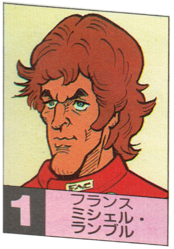
| |
| Nationality | |
| France | |
| Color | |
| Pink | |
| 2: Antonio Zico | |
|---|---|
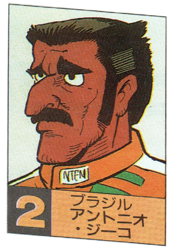
| |
| Nationality | |
| Brazil | |
| Color | |
| Yellow-green | |
| 3: George Turbo | |
|---|---|
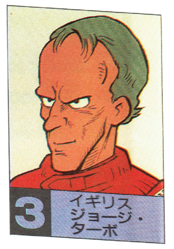
| |
| Nationality | |
| England | |
| Color | |
| Purple | |
| 4: Bronco Maccini | |
|---|---|
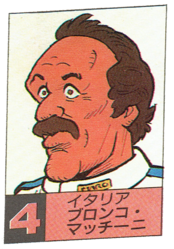
| |
| Nationality | |
| Italy | |
| Color | |
| Red | |
| 5: Howard Axel | |
|---|---|
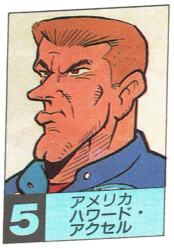
| |
| Nationality | |
| United States | |
| Color | |
| Blue | |
| 6: Panther Pedalf | |
|---|---|
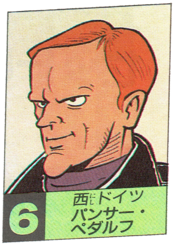
| |
| Nationality | |
| West Germany | |
| Color | |
| Green | |
Additionally, several racers of lesser importance appear in orange cars, primarily as backmarkers; they affect the player's own placement, but do not appear on the minimap. Most drive very slowly, and will often be lapped within the second lap. When they are caught up to from a lap ahead, they are colored teal; lapping them again changes them back to orange, and so on. If a lesser car is collided with twice, it retires and leaves an oil slick in its wake.
Race levels
Grand prix race
| Level 1 | |||||||||||||||||||
|---|---|---|---|---|---|---|---|---|---|---|---|---|---|---|---|---|---|---|---|
|
|
|
| ||||||||||||||||
| Level 2 | |||||||||||||||||||
|---|---|---|---|---|---|---|---|---|---|---|---|---|---|---|---|---|---|---|---|
|
|
|
| ||||||||||||||||
| Level 3 | |||||||||||||||||||
|---|---|---|---|---|---|---|---|---|---|---|---|---|---|---|---|---|---|---|---|
|
|
|
| ||||||||||||||||
| Level 4 | |||||||||||||||||||
|---|---|---|---|---|---|---|---|---|---|---|---|---|---|---|---|---|---|---|---|
|
|
|
| ||||||||||||||||
Time trial race
| Circuit No-1 |
| Circuit No-2 |
| Circuit No-3 |
| Circuit No-4 |
| Circuit No-5 |
| Circuit No-6 |
Gallery
Logos
Artwork
Mario
Miscellaneous
Sprites
- Track
- Map icons
- Pit/finish
- Menu
Screenshots
Maps
Miscellaneous
Names in other languages
| Language | Name | Meaning | Notes |
|---|---|---|---|
| Japanese | ファミコングランプリ F1レース[?] Famikon Guran Puri: F1 Rēsu |
Famicom Grand Prix: F1 Race |
References
- ^ Famicom Grand Prix: F1 Race website. Nintendo of Japan.
- ^ 駄菓子屋ゲーム博物館チャンネル (May 3, 2020). 【激レア賞品】 入賞トロフィー&ゲームウォッチ! ファミコンのF1レースの入賞賞品を紹介しちゃうよ!. YouTube (Japanese). Retrieved July 26, 2024.
External links
| Famicom Grand Prix: F1 Race | ||
|---|---|---|
| Characters | Playable | Mario |
| Opponent | Antonio Zico • Bronco Maccini • George Turbo • Howard Axel • Michel Rumble • Panther Pedalf | |
| Courses | Race levels | Circuit-1 • Circuit-2 • Circuit-3 • Circuit-4 • Circuit-5 • Circuit-6 • Circuit-7 • Circuit-8 • Circuit-9 • Circuit-10 |
| Time trial | Circuit No-1 • Circuit No-2 • Circuit No-3 • Circuit No-4 • Circuit No-5 • Circuit No-6 | |
| Miscellaneous | Cars • Oil slick | |
| Super Mario games | |||
|---|---|---|---|
| Platformers | Super Mario series | Main | Super Mario Bros. (1985, NES) • Super Mario Bros.: The Lost Levels (1986, FDS) • Super Mario Bros. 2 (1988, NES) • Super Mario Bros. 3 (1988, NES) • Super Mario Land (1989, GB) • Super Mario World (1990, SNES) • Super Mario Land 2: 6 Golden Coins (1992, GB) • Super Mario 64 (1996, N64) • Super Mario Sunshine (2002, GCN) • New Super Mario Bros. (2006, DS) • Super Mario Galaxy (2007, Wii) • New Super Mario Bros. Wii (2009, Wii) • Super Mario Galaxy 2 (2010, Wii) • Super Mario 3D Land (2011, 3DS) • New Super Mario Bros. 2 (2012, 3DS) • New Super Mario Bros. U (2012, Wii U) • Super Mario 3D World (2013, Wii U) • Super Mario Maker (2015, Wii U) • Super Mario Run (2016, iOS/iPadOS/Android) • Super Mario Odyssey (2017, Switch) • Super Mario Maker 2 (2019, Switch) • Super Mario Bros. Wonder (2023, Switch) |
| Reissues | VS. Super Mario Bros. (1986, VS) • Super Mario Bros. (1986, G&W) • All Night Nippon: Super Mario Bros. (1986, FDS) • Super Mario Bros. (1989, NGW) • Super Mario Bros. 3 (1990, NGW) • Super Mario World (1991, NGW) • Super Mario All-Stars (1993, SNES) • Super Mario All-Stars + Super Mario World (1994, SNES) • BS Super Mario USA (1996, SNES) • BS Super Mario Collection (1997, SNES) • Super Mario Bros. Deluxe (1999, GBC) • Super Mario Advance (2001, GBA) • Super Mario World: Super Mario Advance 2 (2001, GBA) • Super Mario Advance 4: Super Mario Bros. 3 (2003, GBA) • Classic NES Series (2004-2005, GBA) • Super Mario 64 DS (2004, DS) • Super Mario All-Stars Limited Edition (2010, Wii) • Super Mario Maker for Nintendo 3DS (2016, 3DS) • New Super Mario Bros. U Deluxe (2019, Switch) • Super Mario 3D All-Stars (2020, Switch) • Game & Watch: Super Mario Bros. (2020, G&W) • Super Mario 3D World + Bowser's Fury (2021, Switch) | ||
| Related games | Super Mario Bros. Special (1986, computer) • Wario Land: Super Mario Land 3 (1994, GB) • Super Mario World 2: Yoshi's Island (1995, SNES) • New Super Luigi U (2013, Wii U) • Captain Toad: Treasure Tracker (2014, Wii U) • Super Mario Bros. 35 (2020, Switch) • Bowser's Fury (2021, Switch) | ||
| Canceled games | Super Mario's Wacky Worlds (CD-i) • Mario Takes America (CD-i) • VB Mario Land (VB) • Super Mario 64 2 (N64DD) | ||
| Donkey Kong series | Donkey Kong (1981, arcade) • Donkey Kong (1994, GB) | ||
| Mario vs. Donkey Kong series | Mario vs. Donkey Kong (2004, GBA) • Mario vs. Donkey Kong 2: March of the Minis (2006, DS) • Mario vs. Donkey Kong: Minis March Again! (2009, DSiWare) • Mario vs. Donkey Kong: Mini-Land Mayhem! (2010, DS) • Mario and Donkey Kong: Minis on the Move (2013, 3DS) • Mario vs. Donkey Kong: Tipping Stars (2015, 3DS/Wii U) • Mini Mario & Friends: amiibo Challenge (2016, 3DS/Wii U) | ||
| Mario Bros. series | Mario Bros. (1983, arcade) • Mario Bros. Special (1984, computer) • Punch Ball Mario Bros. (1984, computer) • Mario Clash (1995, VB) | ||
| Wrecking Crew series | VS. Wrecking Crew (1984, VS) • Wrecking Crew (1985, NES) • Wrecking Crew '98 (1998, SFC) | ||
| Other | Mario Bros. (1983, G&W) • Mario's Cement Factory (1983, G&W) • Mario & Wario (1993, SNES) • Hotel Mario (1994, CD-i) • Super Princess Peach (2005, DS) • Princess Peach: Showtime! (2024, Switch) | ||
| Reissues | Crazy Kong (1981, arcade) • Donkey Kong (1982, G&W) • Mario Bros. Returns (1988, FDS) • Donkey Kong (1994, NGW) • Yoshi's Island: Super Mario Advance 3 (2002, GBA) • Donkey Kong/Donkey Kong Junior/Mario Bros. (2004, arcade) • Virtual Console (2006-2016, Wii/3DS/Wii U) • Captain Toad: Treasure Tracker (2018, Switch/3DS) • Mario vs. Donkey Kong (2024, Switch) | ||
| Tech demos | Super Mario 128 (2000, GCN) • New Super Mario Bros. Mii (2011, Wii U) | ||
| Mario Kart series | Main | Super Mario Kart (1992, SNES) • Mario Kart 64 (1996, N64) • Mario Kart: Super Circuit (2001, GBA) • Mario Kart: Double Dash!! (2003, GCN) • Mario Kart DS (2005, DS) • Mario Kart Wii (2008, Wii) • Mario Kart 7 (2011, 3DS) • Mario Kart 8 (2014, Wii U) • Mario Kart Tour (2019, iOS/iPadOS/Android) | |
| Arcade | Mario Kart Arcade GP (2005, arcade) • Mario Kart Arcade GP 2 (2007, arcade) • Mario Kart Arcade GP DX (2013, arcade) • Mario Kart Arcade GP VR (2017, arcade) | ||
| Other | Mario Kart Live: Home Circuit (2020, Switch) | ||
| Ports | Mario Kart 8 Deluxe (2017, Switch) | ||
| Mario Party series | Main | Mario Party (1998, N64) • Mario Party 2 (1999, N64) • Mario Party 3 (2000, N64) • Mario Party 4 (2002, GCN) • Mario Party 5 (2003, GCN) • Mario Party 6 (2004, GCN) • Mario Party 7 (2005, GCN) • Mario Party 8 (2007, Wii) • Mario Party 9 (2012, Wii) • Mario Party 10 (2015, Wii U) • Super Mario Party (2018, Switch) • Mario Party Superstars (2021, Switch) • Super Mario Party Jamboree (2024, Switch) | |
| Handheld | Mario Party Advance (2005, GBA) • Mario Party DS (2007, DS) • Mario Party: Island Tour (2013, 3DS) • Mario Party: Star Rush (2016, 3DS) • Mario Party: The Top 100 (2017, 3DS) | ||
| Arcade | Super Mario Fushigi no Korokoro Party (2004, arcade) • Super Mario Fushigi no Korokoro Party 2 (2005, arcade) • Mario Party Fushigi no Korokoro Catcher (2009, arcade) • Mario Party Kurukuru Carnival (2012, arcade) • Mario Party Fushigi no Korokoro Catcher 2 (2013, arcade) • Mario Party Challenge World (2016, arcade) | ||
| Other | Mario Party 4 (2002, Adobe Flash) • Mario Party-e (2003, GBA) | ||
| Sports games | Mario Golf series | Golf (1984, NES) • Stroke & Match Golf (1984, VS. System) • Golf: Japan Course (1987, FDS) • Golf: U.S. Course (1987, FDS) • Golf (1989, GB) • NES Open Tournament Golf (1991, NES) • Mario Golf (1999, N64) • Mario Golf (1999, GBC) • Mobile Golf (2001, GBC) • Mario Golf: Toadstool Tour (2003, GCN) • Mario Golf: Advance Tour (2004, GBA) • Mario Golf: World Tour (2014, 3DS) • Mario Golf: Super Rush (2021, Switch) | |
| Mario Tennis series | Mario's Tennis (1995, VB) • Mario Tennis (2000, N64) • Mario Tennis (2000, GBC) • Mario Power Tennis (2004, GCN) • Mario Tennis: Power Tour (2005, GBA) (Bicep Pump [Unknown, Adobe Flash] • Reflex Rally [Unknown, Adobe Flash]) • Mario Tennis Open (2012, 3DS) • Mario Tennis: Ultra Smash (2015, Wii U) • Mario Tennis Aces (2018, Switch) | ||
| Super Mario Stadium series | Mario Superstar Baseball (2005, GCN) • Mario Super Sluggers (2008, Wii) | ||
| Mario Strikers series | Super Mario Strikers (2005, GCN) • Mario Strikers Charged (2007, Wii) • Mario Strikers: Battle League (2022, Switch) | ||
| Famicom Grand Prix series | Famicom Grand Prix: F1 Race (1987, FDS) • Famicom Grand Prix II: 3D Hot Rally (1988, FDS) | ||
| Other | Donkey Kong Hockey (1984, G&W) • Baseball (1989, GB) • Super Mario Race (1992, GwB) • Easy Racer (1996, SNES) • Mario Hoops 3-on-3 (2006, DS) • Mario Sports Mix (2010, Wii) • Mario Sports Superstars (2017, 3DS) • LEGO Super Mario Goal (2024, Sky Italia) | ||
| Canceled games | Super Mario Spikers (Wii) | ||
| Role-playing games | Paper Mario series | Paper Mario (2000, N64) • Paper Mario: The Thousand-Year Door (2004, GCN) • Super Paper Mario (2007, Wii) • Paper Mario: Sticker Star (2012, 3DS) • Paper Mario: Color Splash (2016, Wii U) • Paper Mario: The Origami King (2020, Switch) | |
| Mario & Luigi series | Mario & Luigi: Superstar Saga (2003, GBA) • Mario & Luigi: Partners in Time (2005, DS) • Mario & Luigi: Bowser's Inside Story (2009, DS) • Mario & Luigi: Dream Team (2013, 3DS) • Mario & Luigi: Paper Jam (2015, 3DS) • Mario & Luigi: Brothership (2024, Switch) | ||
| Other | Super Mario RPG: Legend of the Seven Stars (1996, SNES) | ||
| Remakes | Mario & Luigi: Superstar Saga + Bowser's Minions (2017, 3DS) • Mario & Luigi: Bowser's Inside Story + Bowser Jr.'s Journey (2018, 3DS) • Super Mario RPG (2023, Switch) • Paper Mario: The Thousand-Year Door (2024, Switch) | ||
| Dr. Mario series | Main | Dr. Mario (1990, NES/GB) • Dr. Mario 64 (2001, N64) • Dr. Mario Online Rx (2008, WiiWare) • Dr. Mario Express (2008, DSiWare) • Dr. Luigi (2013, Wii U) • Dr. Mario: Miracle Cure (2015, 3DS) • Dr. Mario World (2019, iOS/iPadOS/Android) | |
| Other | Dr. Mario (1993, GwB) | ||
| Remakes | Tetris & Dr. Mario (1994, SNES) • Nintendo Puzzle Collection (2003, GCN) • Dr. Mario & Puzzle League (2005, GBA) | ||
| Luigi's Mansion series | Main | Luigi's Mansion (2001, GCN) • Luigi's Mansion: Dark Moon (2013, 3DS) • Luigi's Mansion 3 (2019, Switch) | |
| Arcade | Luigi's Mansion Arcade (2015, arcade) | ||
| Remakes | Luigi's Mansion (2018, 3DS) • Luigi's Mansion 2 HD (2024, Switch) | ||
| Educational games | Mario Discovery Series | Mario is Missing! (1992, MS-DOS) • Mario is Missing! (1993, SNES) • Mario is Missing! (1993, NES) • Mario's Time Machine (1993, MS-DOS) • Mario's Time Machine (1993, SNES) • Mario's Time Machine (1994, NES) • Mario's Early Years! Fun with Letters (1993, MS-DOS/SNES) • Mario's Early Years! Fun with Numbers (1994, MS-DOS/SNES) • Mario's Early Years! Preschool Fun (1994, MS-DOS/SNES) | |
| Mario Teaches Typing series | Mario Teaches Typing (1991, MS-DOS) • Mario Teaches Typing 2 (1996, MS-DOS) | ||
| Other | Family BASIC (1984, FC) • Super Mario Bros. & Friends: When I Grow Up (1991, MS-DOS) | ||
| Ports | Mario's Early Years! CD-ROM Collection (1995, MS-DOS) | ||
| Art utilities | Mario Artist series | Mario Artist: Paint Studio (1999, N64DD) • Mario Artist: Talent Studio (2000, N64DD) • Mario Artist: Communication Kit (2000, N64DD) • Mario Artist: Polygon Studio (2000, N64DD) | |
| Other | I am a teacher: Super Mario Sweater (1986, FDS) • Super Mario Bros. Print World (1991, MS-DOS) • Mario Paint (1992, SNES) • Super Mario Collection Screen Saver (1997, PC) • Mario no Photopi (1998, N64) • Mario Family (2001, GBC) | ||
| Miscellaneous | Picross series | Mario's Picross (1995, GB) • Mario's Super Picross (1995, SFC) • Picross 2 (1996, GB) • Picross NP Vol. 6 (2000, SFC) | |
| LCD handhelds | Mario's Bombs Away (1983, G&W) • Mario's Egg Catch (1990, SMBW) • Luigi's Hammer Toss (1990, SMBW) • Princess Toadstool's Castle Run (1990, SMBW) • Mario the Juggler (1991, G&W) | ||
| Pinball | Pinball (1984, NES) • Super Mario Bros. (1992, arcade) • Super Mario Bros. Mushroom World (1992, arcade) • Mario Pinball Land (2004, GBA) | ||
| Arcade | Mario Roulette (1991, arcade) • Piccadilly Circus: Super Mario Bros. 3 (1991, arcade) • Mario World (1991, arcade) • Terebi Denwa: Super Mario World (1992, arcade) • Super Mario World Popcorn (1992, arcade) • Pika Pika Mario (1992, arcade) • Janken Fukubiki: Super Mario World (1992, arcade) • Koopa Taiji (1993, arcade) • Būbū Mario (1993, arcade) • Mario Undōkai (1993, arcade) • Super Mario World (1993, arcade) • Super Mario Kart: Doki Doki Race (1994, arcade) • Mario Bowl (1995, arcade) • Super Mario Attack (1996, arcade) • Super Donkey Kong 2 Swanky no Bonus Slot (1996, arcade) • Donkey Kong (1996, arcade) • Mario Kart 64 (1996, arcade) • Super Mario 64 (1997, arcade) • Super Mario Bros. 3 (Unknown, arcade) • Super Mario World (Unknown, arcade) • Guru Guru Mario (Unknown, arcade) • Dokidoki Mario Chance! (2003, arcade) • Super Mario Fushigi no Janjan Land (2003, arcade) • New Super Mario Bros. Wii Coin World (2011, arcade) | ||
| Browser | Mario Net Quest (1997, Adobe Shockwave) • Mario's Memory Madness (1998, Adobe Shockwave) • Crazy Counting (1999, Adobe Shockwave) • Dinky Rinky (1999, Adobe Shockwave) • Goodness Rakes (1999, Adobe Shockwave) • Melon Mayhem (1999, Adobe Shockwave) • Nomiss (1999, Adobe Shockwave) • Wario's Whack Attack (1998, Adobe Shockwave) • The Lab (The Bookshelf • The Drafting Table • PolterCue • Ask Madame Clairvoya) (2001, Adobe Flash) • Mario Trivia (Unknown, Adobe Flash) • Mario Memory (Unknown, Adobe Flash) • Virus Attack! (Unknown, Adobe Flash) • Mini-Mario Factory Game! (2004, Adobe Flash) • Bill Bounce (2004, Adobe Flash) • Mario Party 7 Bon Voyage Quiz (2005, Adobe Flash) • Super Mario Strikers (2005, Adobe Flash) • Dr. Mario Vitamin Toss (2005, Adobe Flash) • Bowser's Lair Hockey (2005, Adobe Flash) • Heads-Up (2005, Adobe Flash) • Parasol Fall (2005, Adobe Flash) • Dribble Skillz (2006, Adobe Flash) • Superstar Shootout (2006, Adobe Flash) • Cannon Kaos (2006, Adobe Flash) • 1-Up Hunt! (2006, Adobe Flash) • Super Paper Mario Memory Match (2007, Adobe Flash) • Are You Smarter Than Mario? (2008, Adobe Flash) • Play Nintendo activities (2014–present) | ||
| DSiWare applications | Mario Calculator (2009, DSiWare) • Mario Clock (2009, DSiWare) | ||
| Other games | Alleyway (1989, GB) • Yoshi's Safari (1993, SNES) • UNDAKE30 Same Game (1995, SFC) • Mario's Game Gallery (1995, MS-DOS) • Mario's FUNdamentals (1998, Windows) • Yakuman DS (2005, DS) | ||
| Tech demos | NDDEMO (2001, GCN) • Mario's Face (Unknown, DS) | ||
| Crossovers | Game & Watch Gallery series | Game & Watch Gallery (1997, GB) • Game & Watch Gallery 2 (1997, GB) • Game & Watch Gallery 3 (1999, GBC) • Game & Watch Gallery 4 (2002, GBA) | |
| Super Smash Bros. series | Super Smash Bros. (1999, N64) • Super Smash Bros. Melee (2001, GCN) • Super Smash Bros. Brawl (2008, Wii) • Super Smash Bros. for Nintendo 3DS (2014, 3DS) • Super Smash Bros. for Wii U (2014, Wii U) • Super Smash Bros. Ultimate (2018, Switch) | ||
| Itadaki Street series | Itadaki Street DS (2007, DS) • Fortune Street (2011, Wii) | ||
| Mario & Sonic series | Mario & Sonic at the Olympic Games (2007, Wii) • Mario & Sonic at the Olympic Games (2008, DS) • Mario & Sonic at the Olympic Winter Games (2009, Wii) • Mario & Sonic at the Olympic Winter Games (2009, DS) • Mario & Sonic at the London 2012 Olympic Games (2011, Wii) • Mario & Sonic at the London 2012 Olympic Games (2012, 3DS) • Mario & Sonic at the Sochi 2014 Olympic Winter Games (2013, Wii U) • Mario & Sonic at the Rio 2016 Olympic Games (2016, Wii U) • Mario & Sonic at the Rio 2016 Olympic Games (2016, 3DS) • Mario & Sonic at the Rio 2016 Olympic Games Arcade Edition (2016, arcade) • Mario & Sonic at the Olympic Games Tokyo 2020 (2019, Switch) • Mario & Sonic at the Olympic Games Tokyo 2020 - Arcade Edition (2020, arcade) | ||
| NES Remix series | Main | NES Remix (2013, Wii U) • NES Remix 2 (2014, Wii U) | |
| Reissues | NES Remix Pack (2014, Wii U) • Ultimate NES Remix (2014, 3DS) | ||
| Mario + Rabbids series | Mario + Rabbids Kingdom Battle (2017, Switch) • Mario + Rabbids Sparks of Hope (2022, Switch) | ||
| Other | Excitebike: Bun Bun Mario Battle (1997, SNES) • NBA Street V3 (2005, GCN) • Dance Dance Revolution: Mario Mix (2005, GCN) • SSX on Tour (2005, GCN) • Tetris DS (2006, DS) • Captain Rainbow (2008, Wii) • Art Style: PiCTOBiTS (2009, DSiWare) • Nintendo Land (2012, Wii U) • Puzzle & Dragons: Super Mario Bros. Edition (2015, 3DS) • Nintendo World Championships: NES Edition (2024, Switch) | ||
| Family Computer / Nintendo Entertainment System games | ||
|---|---|---|
| Super Mario franchise | Donkey Kong (1983) • Mario Bros. (1983) • Pinball (1984) • Golf (1984) • Family BASIC V3† (1985) • Wrecking Crew (1985) • Super Mario Bros. (1985) • Super Mario Bros. 2 (1988) • Super Mario Bros. 3 (1988) • Dr. Mario (1990) • NES Open Tournament Golf (1991) • Mario is Missing!* (1993) • Mario's Time Machine* (1994) | |
| Donkey Kong franchise | Donkey Kong (1983) • Donkey Kong Jr. (1983) • Donkey Kong Jr. + Jr. Sansū Lesson† (1983) • Donkey Kong Jr. Math (1983) • Donkey Kong 3 (1984) • Donkey Kong Classics* (1988) | |
| Yoshi franchise | Yoshi (1991) • Yoshi's Cookie (1992) | |
| Wario franchise | Wario's Woods (1994) | |
| Family Computer Disk System | Golf (1986) • Super Mario Bros. (1986) • Super Mario Bros.: The Lost Levels (1986) • I am a teacher: Super Mario Sweater (1986) • All Night Nippon: Super Mario Bros. (1986) • Golf: Japan Course (1987) • Golf: U.S. Course (1987) • Yume Kōjō: Doki Doki Panic (1987) • Famicom Grand Prix: F1 Race (1987) • Donkey Kong‡ (1988) • Famicom Grand Prix II: 3D Hot Rally (1988) • Donkey Kong Jr.‡ (1988) • Mario Bros. Returns‡ (1988) • Wrecking Crew‡ (1989) • Pinball‡ (1989) | |
| Miscellaneous | Nintendo World Championships 1990* (1990) • Nintendo Campus Challenge* (1991) | |
